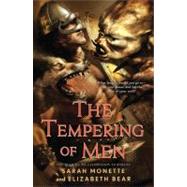
Praise for A Companion to Wolves:
"Coauthors Monette (Mélusine) and Bear (Blood and Iron) combine their literary talents in a saga of warriors whose love for their wolves and for one other serves to bind them together into a band of fierce protectors. Recommended for adult-themed fantasy and fiction collections."--Library Journal
"It's not surprising either that [A Companion to Wolves] is extremely well written, and more suspenseful than most contemporary fantasy I've read."--Don D’Ammassa
"What Bear and Monette have done for wolves in this book is no more and no less than what Anne McCaffrey has done for dragons--they have made the wolf iconic, memorable, something larger than life...The storyline is gripping--I read this thing at a sitting--the writing is exquisite, and the book is destined to be a classic of its kind."--SF Site Reviews
The New copy of this book will include any supplemental materials advertised. Please check the title of the book to determine if it should include any access cards, study guides, lab manuals, CDs, etc.
The Used, Rental and eBook copies of this book are not guaranteed to include any supplemental materials. Typically, only the book itself is included. This is true even if the title states it includes any access cards, study guides, lab manuals, CDs, etc.